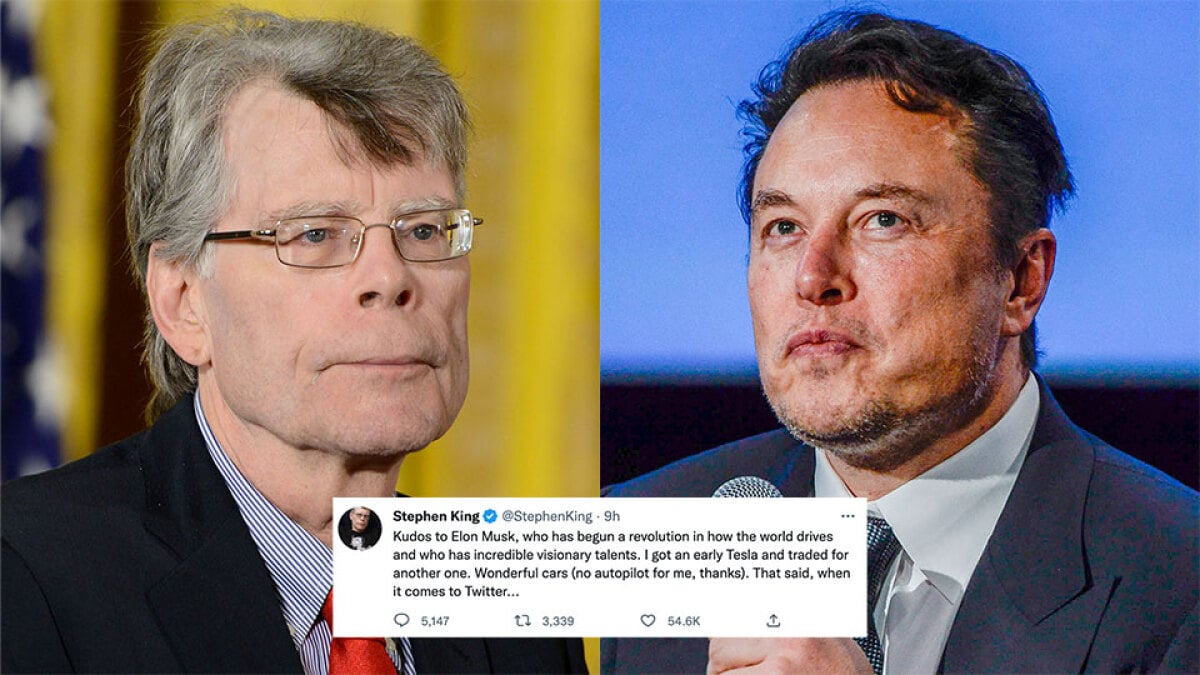Stephen King Vs. Hollywood: 5 High-Profile Feuds

Table of Contents
The Shining (1980): Kubrick's Vision vs. King's Nightmare
King's Public Disdain
Stephen King's vocal criticism of Stanley Kubrick's adaptation of The Shining is legendary. King famously disliked Kubrick's interpretation, believing it deviated significantly from the novel's core themes.
- King felt Kubrick's film lacked the psychological horror elements central to the book. He criticized the altered portrayal of Jack Torrance, arguing that Kubrick's version lacked the subtle descent into madness depicted in the novel.
- The ending, a crucial point of divergence, drew significant ire from King. The book's nuanced conclusion contrasted sharply with the film's more ambiguous and arguably less satisfying resolution.
- King has often expressed his preference for the 1997 miniseries adaptation, starring Steven Weber, which he felt was more faithful to his original vision. He even went so far as to say the miniseries was “the one that got it right.”
King's dissatisfaction is well-documented, with quotes like, “[Kubrick's] version… is not my book,” readily available in numerous interviews. His frustration showcases the significant creative differences that can arise between an author and a director.
The Legacy of a Controversial Adaptation
Despite King's disapproval, Stanley Kubrick's The Shining remains a landmark achievement in horror cinema.
- Its iconic imagery, particularly Jack Nicholson's crazed performance and the unsettling twins, has become ingrained in popular culture.
- The film has received significant critical acclaim, often cited as one of the greatest horror films ever made, regardless of its divergence from the source material.
- Its influence on subsequent horror films is undeniable, shaping the visual language and thematic concerns of countless works.
Kubrick's The Shining stands as a testament to the power of cinematic vision, even when that vision clashes directly with the author's intentions. This conflict exemplifies a key element of the "Stephen King vs. Hollywood" narrative.
Carrie (1976): A Mostly Successful Adaptation with Lingering Issues
Initial Acceptance, Then…
Brian De Palma's Carrie is often cited as one of the more successful Stephen King adaptations. While largely faithful to the source material, King did express some reservations.
- Sissy Spacek's powerful performance as Carrie White is universally praised, capturing the character's vulnerability and rage effectively.
- The film largely mirrors the book's plot and character arcs, effectively translating King's chilling tale to the screen.
- While overwhelmingly positive, some minor creative differences, perhaps concerning specific scene interpretations or pacing, may have led to minor friction, though nothing on the scale of The Shining conflict.
Comparing and contrasting specific scenes, such as the prom night climax, reveals how De Palma managed to maintain the core emotional impact of King's work while utilizing his distinct cinematic style. This highlights the potential for successful collaborations even when adjustments are made.
The Shawshank Redemption (1994): A Triumphant Collaboration
A Rare Example of Harmony
The Shawshank Redemption stands as a rare example of a harmonious collaboration between Stephen King and Hollywood.
- Frank Darabont's masterful direction and Tim Robbins and Morgan Freeman's stunning performances resulted in a critically acclaimed masterpiece.
- The film is consistently ranked among the greatest films of all time, receiving widespread praise for its story, acting, and direction.
- King's involvement and his reported satisfaction with the adaptation solidify The Shawshank Redemption as a triumph in the "Stephen King vs. Hollywood" narrative.
Anecdotes about King's involvement during the production further underscore the positive working relationship between the author and the filmmaker. This showcases the possibility of a successful adaptation when author and director share a common vision.
The Running Man (1987): A Significant Departure
King's Disappointment
Paul Michael Glaser's The Running Man represents a significant departure from Stephen King's original novella. This adaptation led to significant disappointment for King.
- The film drastically altered the novella's dystopian themes, shifting the focus from social commentary to action-oriented entertainment.
- The plot was considerably changed, departing from the novella's subtle nuances and psychological elements in favor of a more straightforward action-adventure storyline.
- King's overall dissatisfaction highlights the challenges of adapting a satirical dystopian novella with profound social commentary into a more commercially viable action film.
Comparing the book’s subtle commentary on media manipulation and societal control with the film's emphasis on Arnold Schwarzenegger's action-hero persona illustrates the significant tonal and thematic shifts made in the adaptation. This exemplifies a less successful negotiation between the author's intentions and the studio's demands.
It (2017/2019): A Modern Masterpiece (Mostly)
A New Era of Adaptation
Andy Muschietti's two-part adaptation of It marked a significant success, receiving largely positive feedback from both critics and Stephen King himself.
- Muschietti managed to successfully capture the chilling atmosphere and emotional depth of King's sprawling novel.
- The film stayed largely faithful to the source material, while still making necessary cinematic adjustments for pacing and narrative flow.
- The performances, especially those of the child actors, received high praise, contributing to the film's overall success.
While some minor criticisms might have been voiced by King or reviewers regarding specific details, the overall reception of the film remains highly positive, demonstrating a successful modern adaptation within the "Stephen King vs. Hollywood" canon.
Conclusion
Stephen King vs. Hollywood is a complex and fascinating relationship. While many adaptations have faced significant alterations, resulting in clashes between the author and filmmakers, the overall impact on the horror genre has been undeniable. From iconic masterpieces to disappointing departures, these five feuds demonstrate the challenges and triumphs of bringing Stephen King’s work to the big screen. Whether you prefer a faithful adaptation or a director’s bold interpretation, the enduring power of Stephen King's storytelling and the ongoing debate surrounding his adaptations guarantee a continued fascination with the "Stephen King vs. Hollywood" dynamic. Explore more of these fascinating adaptations and disagreements by researching more on "Stephen King vs. Hollywood" today!

Featured Posts
-
 Lynk Lee Tu Quyet Dinh Chuyen Gioi Den Nhan Sac Rang Ro Va Tinh Yeu Vien Man
May 10, 2025
Lynk Lee Tu Quyet Dinh Chuyen Gioi Den Nhan Sac Rang Ro Va Tinh Yeu Vien Man
May 10, 2025 -
 T Mobile Penalty 16 Million For Years Of Data Breaches
May 10, 2025
T Mobile Penalty 16 Million For Years Of Data Breaches
May 10, 2025 -
 New Uk Visa Regulations Implications For Nigerians And Pakistanis
May 10, 2025
New Uk Visa Regulations Implications For Nigerians And Pakistanis
May 10, 2025 -
 Ministre Francais De L Europe Defend Le Partage Du Bouclier Nucleaire
May 10, 2025
Ministre Francais De L Europe Defend Le Partage Du Bouclier Nucleaire
May 10, 2025 -
 Adae Fyraty Me Alerby Thlyl Bed Antqalh Mn Alahly
May 10, 2025
Adae Fyraty Me Alerby Thlyl Bed Antqalh Mn Alahly
May 10, 2025
